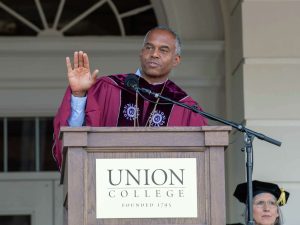Student Comments on Legacy of Queen Elizabeth
September 29, 2022
September 8, 2022 is the day when the news of Queen Elizabeth’s death hit the world. It did not take much time for her death to be on everyone’s lips. Tributes from all over the world began pouring in as the World sought to pay respects to Britain’s longest serving Monarch. However, these diplomatic gestures do not necessarily reflect the sentiment of the majority according to The Times. In addition to international activists, students at Union College grappling with the effects of the Queen’s role in the wake of British imperialism share their opinion on the late Queen.
Conversations began at the dinner table regarding the revisionism involving the queen and her legacy. As Shola Mos-Shogbamimu, a British-Nigerian activist speaking with Al Jazeera, put it succinctly, “the Queen’s legacy is now so whitewashed and shrouded with exaggerated epitaphs that, while respecting people’s rights to mourn her passing, I feel compelled to shred this revisionist history with some pointed truth-telling.” Mos-Shogbamimu argues that her legacy revolves around the inability to take responsibility for crimes committed under her government. Liz Truss, the British Prime Minister, herself affirmed this stance when she said “Britain is the great country it is today because of her.” Hence as Shola Mos-Shogbamimu remarks, “The queen cannot be the reason for Britain’s greatness without also taking ownership for the atrocities committed by governments under her – for which she never personally apologized.”
Ansh Singhal ‘24 speaks to the death of Queen Elizabeth and how he viewed her death. He remarks “that celebrating death is pretty grim but my honest thoughts were happiness.” Singhal continues, “deep inside, I feel that I should be allowed to celebrate the death of a symbol of tyranny for my people.” He comments “apart from waving her hands, going to galas on behest of tax payer money, ignoring blatant genocide committed by an empire she represented for most of her life, not much.” Singhal continues, “the celebration of her life is a sick marking of all the monarchy has caused not that long ago. It is not even three generations ago that the British were alive carrying out colonial rule.”
Singhal remarks, “it hurts that she has a legacy at all, because what she represents is the worst that’s ever happened to my people. She is the reason there is so much divide within my country and there is a divide across what should have been my country.” He mentions “that just because Britain was forced to give up much of its colonial power, they should not be allowed to rewrite history like that. They are not the good guys in history.” He ends by mentioning “that I feel a sense of duty to never forget what happened to my ancestors. What the British did to us should simply not be forgotten.”
The old adage that the sun never sets on the British Empire, reminds us of the peak of the empire in all its horrors. Yet when the sun sat on Queen Elizabeth II’s “illustrious” life the discourse became one of virtue, glory and dedication.
For former colonies, however, this “dedication” and “years of service” do not mean much for they accompanied with them forms of oppression and injustice. To them she was the symbolic face of an empire responsible for the horrors that the officers of the British Empire carried out in the name of the Crown.






